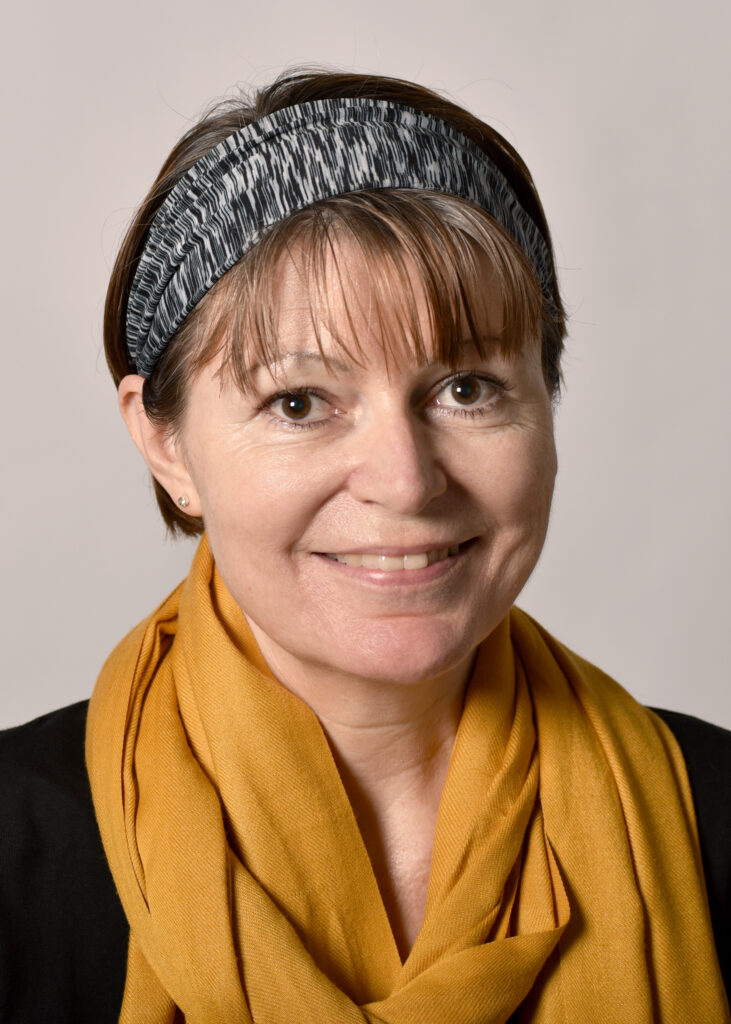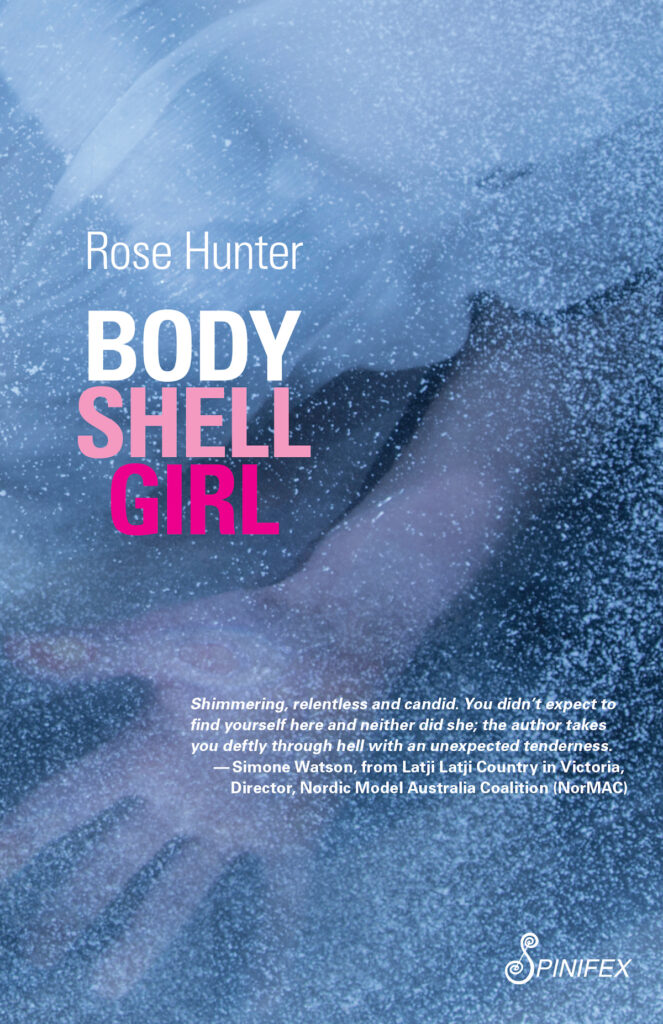Content notification: This post discusses sexual violence and trauma.
‘Body Shell Girl’ is a memoir in verse about the first two years of a decade that Australian Rose Hunter spent in the sex industry in Canada. Rose hoped she could do only what was required of her, without experiencing trauma or side effects and leave the industry on her own terms. But she was shattered by what unfolded. Her book portrays a dehumanising, destructive and misogynist industry. BroadAgenda’s editor, Ginger Gorman, asked Rose a few questions.
- Tell us a little bit about who you are in a nutshell?
I’m a sober and basically optimistic woman with a persistent streak. After a tumultuous existence as an active addict for most of the first forty years of my life (I had an eating disorder already as a child)—in my forties I found a way of living in peace with myself, and I’m grateful every day for it.

Author Rose Hunter.
- You’re Australian. How did you end up in the sex industry in Canada?
As a young person I thought Australia was one cause of my unhappiness, and my eating disorder, and I thought life would be different if I could be somewhere else. So I got a working visa for Canada, which I was able to get as a recent university graduate.
The visa was for one year, but I left with a firm desire never to come back. Some people call this “doing a geographical.” That is, moving geographically in an attempt to change the (inner) self. As most people who aren’t addicts know, this doesn’t work. I was not the picture of mental health before I got into the industry.
- I’m interested in the contrast of what you hoped you’d achieve in the sex industry vs what actually happened. What was your initial dream? What did you imagine?
The first thing I imagined was being able to pay my rent that month. A bit later I thought I’d use this industry as a way of “getting ahead” so to speak. It was my dream to work in film (behind the cameras), and I thought the sex industry could pay for the education I thought I needed to get into my dream career.
- You thought you could only do what was required of you. But your experience was very different from this. What actually unfolded?
I got deeper into the industry than I intended. Crossing over from the massage parlours into what the industry calls “full service” (how this came about is described in the book), felt like stepping through a one-way door—that and being raped shortly after, and the fact that I didn’t graduate from film school. More and more the impression I got—which was reinforced with every misstep I took—was that there was no other way I could make enough money to support myself, and there never would be.
- Your book is highly unusual because you’ve chosen to tell it in verse. Why? (I’m interested that folks have used words like “tender” and “visceral” to describe this work…)
I was poet before writing this book. I’ve had several previous books of poetry published that largely don’t touch on this theme. My aesthetic is to approach a piece of writing as art first, and trust that if there is an accompanying message, it will emerge truthfully from the material. That is what happened with this book.
But it took me a long time, and many failed attempts. Once I started writing this version of the book, I realized I was interested in what sort of different telling of my story poetry might be able to accomplish. I was also aware that there were already quite a few prose memoirs on the topic, and I had a desire to do something different, form-wise.
Additionally, I wanted to write a specific kind of poetry for this book. I wanted it to be narrative and entertaining; to move more like prose—but still be poetry, with literary poetry values. I wanted the book to be enjoyed both by poetry readers and by people who didn’t ordinarily read poetry. This was a difficult thin line to tread. But it seems I got there. People who haven’t read a book of poetry since high school have messaged me to say they loved the book. That really warms my heart.
Tender? Well, I can see that too, perhaps in poems like “Rick,” or “Aquarium,” which have what I think are more sympathetic men. Unfortunately, my narrator (me-then) lacks tenderness for herself in the book. But I do feel there is implied tenderness—me-now feels tender towards me-then these days.
This self-compassion really came about during the writing of the book, and I believe it comes through in some of the dark humour, for example, and in the portrayal of my narrator’s idiosyncratic and sometimes immature (young in the mind) thought patterns and habits.

Body Shell Girl Cover Image
- Your incredible book of verse discusses an industry that’s dehumanising and misogynist. Tell me about that.
Well, how can I count the ways! There are too many, for this word length.
This is an industry in which men “order” what they want, off what is often called a menu. They are incredibly specific. Every feature of a woman or girl is atomized. Age, race, skin colour, weight, measurements, bra size, real or fake boobs, shaved or trimmed, and also very important: how convincingly will she pretend that she wants it? Or is she one of those ‘bitches’ who dares to admit she is only there for the money, or who watches the clock? How violent and degrading can you be with her? How much can you get from her for your money?
It is easy to be critical of the worst “johns” [as clients of sex workers are sometimes called – Ginger’s note], but the fact is that supposedly “nice” men discuss women in the sex industry in ways similar to this, openly in internet forums and among each other, as well as with women who aren’t their wives, and who they think won’t rat them out.
Part of the reason they think it’s OK to talk like that is because there is an increasingly mainstreamed place where it is perfectly acceptable and normal to talk like that, and to act it all out, and that is the sex industry.
The effects of this toxic industry can be seen everywhere.
- What traumas did you suffer in the industry? How have you healed?
I was raped, as well as assaulted on very many occasions, none of which registered as assault at the time, because it was just business as usual.
Eventually I drank to excess daily and took tranquilizers to cope with it all, and I got involved with violent men (I am also a survivor of intimate partner violence).
There’s so much I could say about the healing process (it’s such a large topic for me)—but the main thing I can say here is that healing for me started when I got sober, and free of my pill addiction and eating disorder as well.
- What do you want readers to take away from your work?
I hope I’ve written a book that has many different takeaways, depending on the reader. But one major one I can point to is that I set out to create a vivid and emotional experience. I wanted readers to be able to step inside the existence of someone who was in this industry for an extended period of time, and experience some part of what that was like.
Having had the experience of my book, readers can then ask their own questions, about whether they should call up that escort tonight, for example, or whether they think so-called “sex work” is really a job like any other that should be endorsed by our laws and popular representations.
Please note: Feature image is a stock photo
Ginger Gorman is a fearless and multi award-winning social justice journalist and feminist. Ginger’s bestselling book, Troll Hunting,came out in 2019. Since then, she’s been in demand both nationally and globally as an expert on cyberhate and the real-life harm predator trolling can do. She's also the editor of BroadAgenda and gender editor at HerCanberra. Ginger hosts the popular "Seriously Social" podcast for the Academy of the Social Sciences in Australia. Follow her on Twitter.





